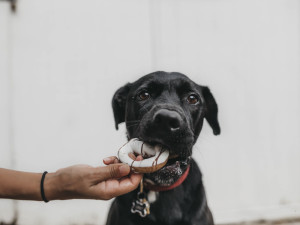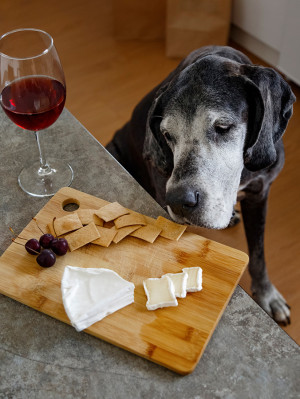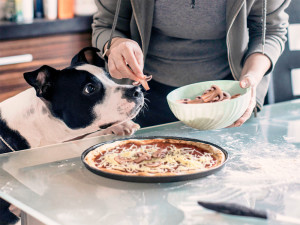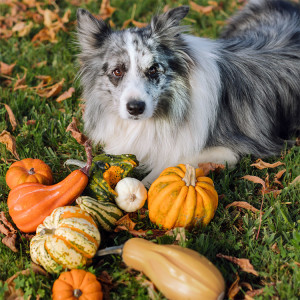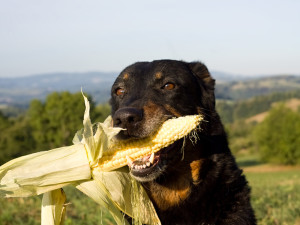Can Dogs Eat Onions?
Add them to the list of no-nos in the kitchen. Here’s why.
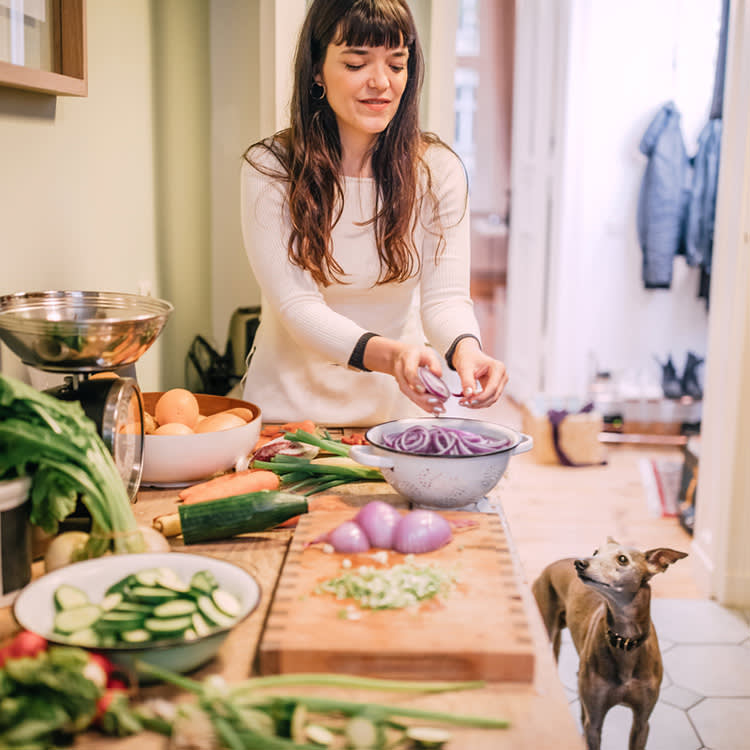
Share Article
French onion soup, onion rings, creamed pearl onions, even the bloomin’ onion… the ways to enjoy onions are endless, unless you’re a dog, in which case, there are zero ways to enjoy onions. Dogs cannot eat onions, and onions are actually considered toxic to dogsopens in a new tab. Depending on how much onion a dog eats, they can experience a range of symptoms from the mild to the severe.
While many foods are safe to share with your dog, onions are one of those that should never be shared. It is important to keep this in mind whenever you share any food with your pup; what may be harmless to us can be dangerous for them. Be sure to double-check the ingredients before sharing your food with them because prepared foods and condiments often contain onions, and we may not realize it. Read on to learn all about the risks of onions for dogs.

littleKin™ is Kinship’s home just for puppy and kitten parents. Check it out for expert advice, new pet tools, and a free box of food samples.
opens in a new tabNutrition facts about onions for dogs
Onions are the bulb of a plant called Allium cepa. The Allium genus also includes other edible plants, such as garlic, leeks, shallots, chives, scallions, and ramps. Many of these plants are used for their powerful flavors and are common ingredients in dishes cooked around the world.
Onions also provide health benefits, such as fiber, vitamin C, and antioxidant properties. Unfortunately, your dog cannot benefit from these healthy nutrients in onions, but the good news is that many safe, edible plantsopens in a new tab also contain these same nutrients.
Are onions good for dogs?
Onions are not good for dogs, and in fact are considered toxic to them. In onions, the main toxic compound is called N-propyl disulfide. These compounds can cause digestive upset including vomiting, diarrhea, and loss of appetite at lower doses.
At higher doses, they can cause more serious damage to red blood cells called hemolytic anemia. This can cause your pup to have pale gums, difficulty breathing, and to feel very weak and lethargic. In some cases, it can take up to five days for dogs to show obvious signs of onion toxicity, so it’s important to see your vet as soon as you realize your dog ate onions or another allium plant.
Can dogs eat cooked onions or onion powder?
No, dogs cannot eat cooked onions or onion powder. Cooked onions, dried onions, and even onion powders are all toxic to dogs. Actually, some toxins are released in greater amounts through the chopping and cooking process, so cooked onions can be more dangerous in some cases. Additionally, dried onions and onion powders also tend to have more concentrated amounts of these toxins, so not only are they toxic, but dogs only need to consume small amounts of these products to experience the same effects.
What are the signs of onion toxicity?
If you see your dog consume onions or realize they ate something with onions as a main ingredient, be sure to contact your vet and a pet-poison hotline. They can help you determine if the amount your dog ate is likely to cause serious illness based on the type of onion product consumed, the amount they ate, and your their weight.
If your dog consumed enough to be a serious problem, it is important to get to a vet as soon as possible to start treatments that may help to protect them and to start monitoring for more serious problems like anemia. Sometimes, dogs don’t show signs of the toxicity for up to five days, so it does not mean they are in the clear if they are acting fine at first. Some common signs of onion toxicity include:
Gastrointestinal upsetopens in a new tab: vomiting, loss of appetite, and diarrhea can all be effects of onion toxicity as compounds in onions and other allium plants irritate the lining of the digestive tract.
Lethargy and weakness: Dogs with anemia, or low red blood cell counts, will often be lethargic and weak because they don’t have enough red blood cells to transport oxygen throughout their body.
Rapid breathing and difficulty breathing: As the body senses a lack of oxygen in the tissues, it tries to compensate by breathing faster and harderopens in a new tab. But because there are not enough red blood cells to transport the oxygen, this does not improve their signs.
Yellow tint to skin and eyes: This yellow tint is known as icterus and is the result of hemolysis, or the breakdown of red blood cells. When red blood cells are destroyed, they release bilirubin, a pigment that can cause that yellowish tint. It is most obvious on the whites of the eyes and areas with lighter skin such as ear flaps or on the belly. It will also cause the serum portion of the blood to look yellow.
Pale gums: Dogs with anemia will have pale pink or white gumsopens in a new tab, instead of their normal bright bubble-gum pink tint. This is because they have less red blood cells in circulation, resulting in pale tissues.
Dark-brown urine: This may be due to hemolysis, which causes that yellow color, as well as a secondary process that results in the formation of methemoglobin in the blood. This can cause the blood and urine to have a darker brown pigmentation as well.
The bottom line: Can dogs eat human food?
While dogs can eat many foods intended for people, onions are a good example of why it is always important to double-check ingredientsopens in a new tab before sharing foods with your dog. Onions and garlic are so common in our food that we may not think about how often they may be used in cooking various dishes. And that is not the only ingredient to be aware of when sharing foods with your pup. There are quite a few foods that can be toxic to dogs, as well as others that can put them at risk for digestive upset or even pancreatitisopens in a new tab.
Often, the safest option is to share foods with your dog that are plain and don’t have too many ingredients so you can keep it simple. Luckily, dogs can enjoy many fruits and vegetablesopens in a new tab and reap some valuable health benefitsopens in a new tab in the process. Just be sure to keep all treats and table scraps to a minimum to ensure they get the bulk of their calories from a complete and balanced dog food that will meet their nutritional needs.
Foods that are safe for dogs
Butternut squashopens in a new tab is a good example of a safe and healthy food to share with your pup.
Carrots are also a good choiceopens in a new tab.
Eggs can be a high-protein optionopens in a new tab for your pup.
Other foods that are dangerous
Grapes and raisinsopens in a new tab are also toxic to dogs.
Chocolate, coffee and these other toxic foods opens in a new tabshould always be avoided, too.
While some cheeses are OK in small amounts, here’s why you shouldn’t share too much opens in a new tabwith your dog.
FAQs (People also ask):
How much onion can a dog eat?
Dogs should not eat any amount of onion; it’s toxic to them. The toxic amount depends on the type of onion, such as cooked, dried, powdered, and the size of the dog.
Is it OK to give dogs onions?
No, it is not OK to give dogs onions. They are toxic to dogs, as are all plants in the Allium genus, including garlic, chives, leeks, scallions, shallots, and ramps.
Can dogs eat onion powder?
No, onion powder is also toxic to dogs and often, it has more concentrated amounts of the toxic compounds, so dogs can get sick from eating a small amount.
References:

Dr. Amy Fox, DVM
Amy Fox, DVM is a small animal veterinarian in New York City. A lifelong animal lover, Dr. Fox studied biology in college and then worked as a veterinary nurse before pursuing veterinary school at Cornell University. She has worked in many different settings including shelter medicine, emergency medicine, general practice, and animal cruelty and forensics. She is especially interested in nutrition, preventative medicine and care for senior pets. Dr. Fox also enjoys writing about veterinary medicine and teaching. In her free time she loves to cook, garden, and go for long runs.
Related articles
- opens in a new tab
Can Dogs Eat Pecans?
Here’s why you should keep your pup far, far away from this nut.
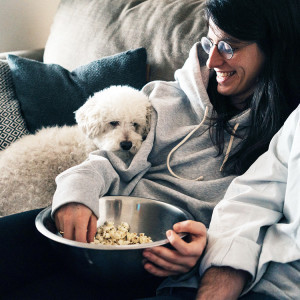 opens in a new tab
opens in a new tabCan Dogs Eat Popcorn?
Your pup wants in on movie night.
- opens in a new tab
Can Dogs Eat Butternut Squash?
Your winter farmers’ market is full of the stuff. Find out if your dog can have some.
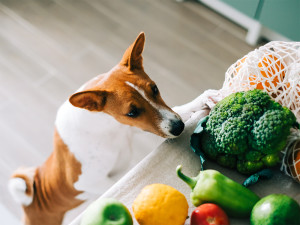 opens in a new tab
opens in a new tabCan Dogs Eat Broccoli?
Find out how to safely get your pup their greens.
- opens in a new tab
Can Dogs Eat Corn?
A few kernels are fine—but keep it off the cob.
 opens in a new tab
opens in a new tabCan Dogs Eat Sweet Potatoes?
Add it to the list of healthy human superfoods pups can eat, too.

